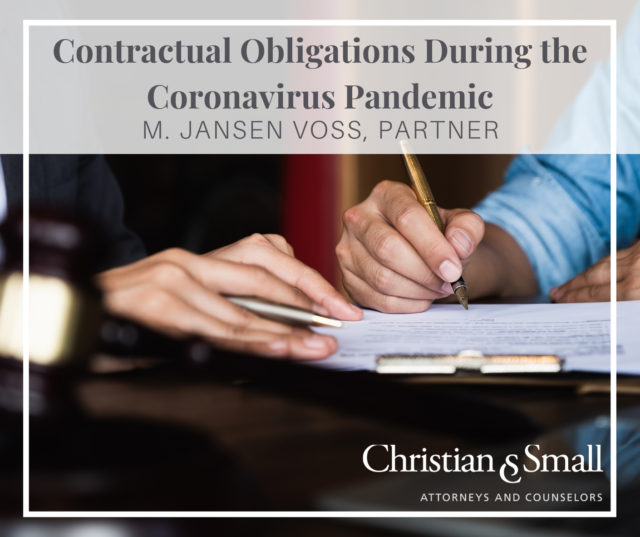

We are beginning to see the effects of the coronavirus on commerce, including supply chain disruption, lower demand for certain goods and services, lower demand for business travel, and mass cancellations of industry conferences. In recent weeks, I have been counseling business clients on these issues. One question keeps coming up: Can I (or can they) use the coronavirus pandemic to excuse performance under a contract?
As with most legal issues, it depends. But, the first thing you need to do is read the contract. Many contracts include force majeure clauses. Force majeure refers to unforeseeable and unavoidable events (not the result of a party’s own actions) that make it impossible for the party to perform the contract. Wars, riots, labor strikes, government actions, and natural disasters like hurricanes, tornados, earthquakes, and floods can all be force majeure events. If the force majeure clause in your contract expressly and specifically addresses acts of God, epidemics, pandemics, quarantines, and governmental actions, the contract controls.
Even if your contract does not include a force majeure clause or does not specifically address pandemics, quarantines or government action, force majeure may still be an available defense under Alabama law. When a “loss is proximately caused by an act of God which is not foreseeable, the [contracting party] may not be liable for failure to effectuate the performance of a contract. Louisville & N.R. Co. v. Finlay, 170 So. 207 (Ala. 1936). “To be considered an ‘act of God,’ the force of nature causing the injury must have been the proximate cause of the injury, such that no other act could have prevented the result. SeeHill Air of Gadsden, Inc. v. Marshall, 526 So.2d 15 at 16–17 (Ala. 1988); Bradford v. Universal Construction Co., 644 So.2d 864 at 866 (Ala. 1994).
Although the Restatement (Second) of Contracts, § 261, provides that if performance of a contractual obligation is impossible or impracticable, then the obligation is discharged absent contractual language to the contrary, Alabama courts have held this not to be the law in Alabama. Silverman v. Charmac, Inc.,414 So. 2d 892 (Ala. 1982) However, a party may have an excuse for non-performance under a contract if performance becomes impossible by reason of a change in the law or by some government action. Hawkins v. First Federal Savings & Loan Ass’n., 280 So.2d 93 (Ala. 1973); Greil Bros. Co. v. Mabson, 60 So. 876 (Ala. 1912); Jewel v. Jackson & Whitsitt Cotton Co., 313 So.2d 157 (Ala. 1975)
Jersey Ice Cream Co. v. Banner Cone Co., is an old case but it illustrates the impossibility defense very well. 86 So. 382 (Ala. 1920) Banner Cone Company contracted to ship 1,000,000 ice cream cones to Jersey Ice Cream Company. After the parties entered into the contract, the government placed wartime restrictions on the use of the main ingredients for the manufacture of cones. Banner provided as many ice cream cones as it could while maintaining compliance with the wartime restrictions. However, Banner claimed it was impossible for it to provide the remaining ice cream cones contemplated under the contract. The Alabama Supreme Court held that the impossibility of performance exception applied because wartime food regulations made it impossible for Banner Cone Company to perform under the contract. Id. There is a clear parallel between the wartime government restrictions faced by Banner Cone Company and government restrictions businesses are currently facing in the coronavirus pandemic.
For contracts interpreted under the Alabama Commercial Code, if a contract does not contain a force majeure clause, and the contract does not state that a party assumes the risk of non-performance, a delay in delivery or non-delivery of goods is not in breach of contract if delivery of goods has been “made impracticable by the occurrence of a contingency the nonoccurrence of which was a basic assumption on which the contract was made or by compliance in good faith with any applicable foreign or domestic governmental regulation or order whether or not it later proves to be invalid.” Alabama Commercial Code, section 7-2-615(a) This provision excuses performance where performance under the contract is commercially impracticable due to unforeseen circumstances not contemplated by the parties to the contract. It is unlikely that parties to a contract in late 2019 or early 2020 could have foreseen the commercial impact of the coronavirus here in the southeastern United States.
Dust off those contracts, understand what you have contracted to do, think objectively about your ability to perform those responsibilities given the uncertain times we face, and be prepared to assert defenses outlined above in the event you find the coronavirus has made it impossible for you to perform contractual duties. As we have done over the past few weeks, we will continue to discuss legal issues as they arise in the collateral damage of the coronavirus pandemic. Force Majeure is simply one of the long lists of legal issues we are tracking as the world confronts the coronavirus threat.
Christian & Small LLP represents a diverse clientele throughout Alabama, the Southeast, and the nation with clients ranging from individuals and closely-held businesses to Fortune 500 corporations. By matching highly experienced lawyers with specific client needs, Christian & Small develops innovative, effective, and efficient solutions for clients. With offices in Birmingham, metro-Jackson, Mississippi, and the Alabama Gulf Coast, Christian & Small focuses on the areas of litigation and business, is a member of the International Society of Primerus Law Firms, and is the only Alabama-based member firm in the Leadership Council on Legal Diversity. Our corporate social responsibility program is focused on education, and diversity is one of Christian & Small’s core values.
No representation is made that the quality of legal services to be performed is greater than the quality of legal services performed by other lawyers.
You must be logged in to post a comment.